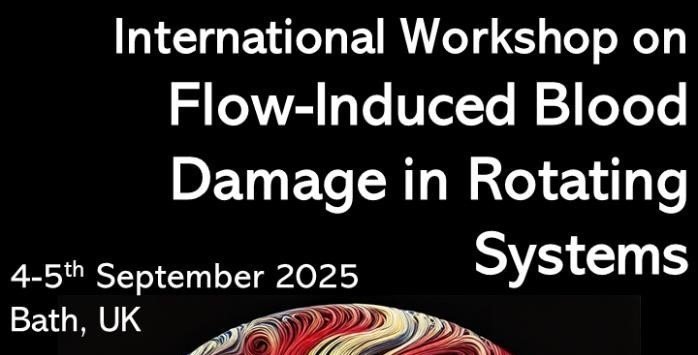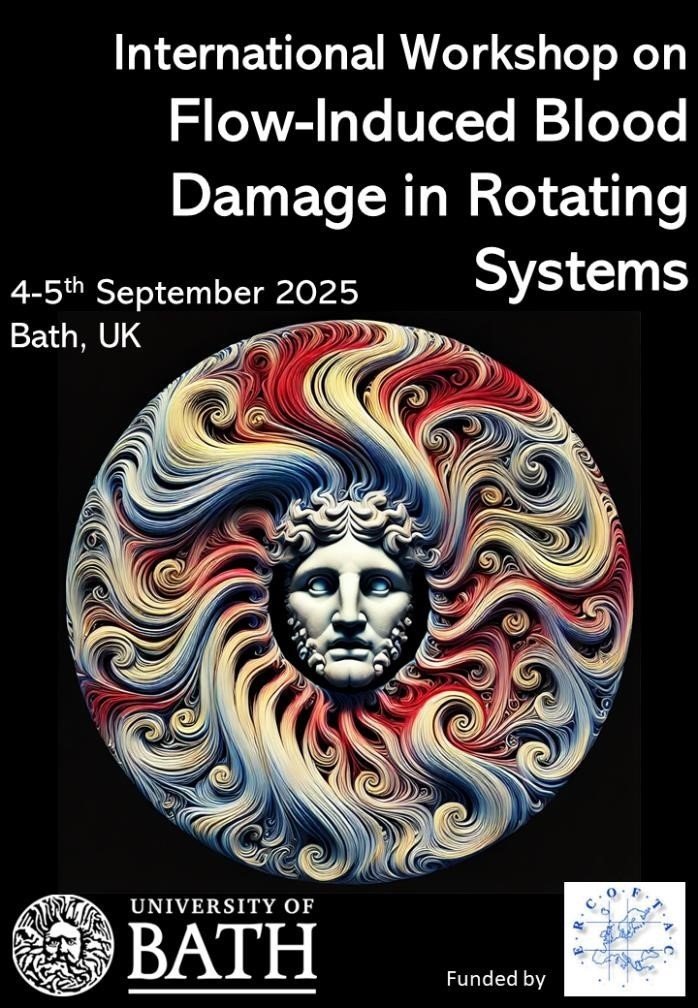5th International Workshop on Flow-Induced Blood Damage in Rotating Systems (BDW2025)
4th - 5th September 2025
University of Bath, UK
Organisers:
Dr Katharine Fraser
Department of Mechanical Engineering, University of Bath, UK
Dr.-Ing. Benjamin Torner
Institute of Turbomachinery, University of Rostock, Germany
Link to the workshop blog: https://blogs.bath.ac.uk/blood-damage-workshop/2025/
Flow induced blood damage is one of the main causes of post-surgical complications in patients with Ventricular Assist Devices and other types of blood contacting medical devices. Fluid dynamics is the basis of this problem; solving it requires an understanding of blood flow, including blood rheology, secondary flows, multiphase flows and transition to turbulence, as well the interaction between the flow and the biological processes resulting in damage. Solving this problem is of the utmost importance to patient safety and wellbeing, and so is important to academic and clinical researchers, and the medical technology industry.
Research on flow-induced blood damage is the main topic in our Cardiovascular Engineering Research Group, a research group within the both the Department of Mechanical Engineering and the Centre for Bioengineering and Biomedical Technologies at University of Bath. In order to promote international research in this area, we invite the “Biomedical Fluid Mechanics” community to a workshop, to discuss current research on flow-induced blood damage with special focus on rotating systems. We will discuss theoretical approaches to blood damage mechanisms and their application to rotating blood pumps and ECMO. The workshop will focus on numerical modelling of blood flow in the systems and experimental investigation of blood damage.
New Important Dates:
Abstract submission: 17th June 2025
Abstracts should be around 300 words and can include figures,
but should be no more than 1 A4 page.
Send abstracts to: bdw2025@bath.ac.uk
Fee Structure:
Early Bird Registration Fee (by 30th June 2025): €170
Registration fee (by 31st August 2025): €200
ERCOFTAC members discount fee: €170
Reduced fee for ERCOFTAC members.
All participants will receive all presented and generated scientific results after the workshop.
History:
The first edition of the workshop took place in 2019, and subsequent editions in 2022, 2023 and 2024. To date all editions have taken place in Rostock Warnemünde. All events provided a successful platform for the relevant research community. The workshop was attended by participants from Australia, China, UK, Czech Republic, Sweden, Italy, Germany and Romania. The university participants represented biorheology, physics of cell damage and flow-induced stresses on cells in rotary blood pumps and ECMO. During the workshops we discussed the state-of-the-art approaches to blood damage modelling and ongoing research projects. By locating the next workshop in Bath, UK we hope to further diversify the geographic locations of the participants.
Highlights of 2024 workshop were presentations on strain-based modelling of hemolysis from Ilaria Guidetti (Italy) and Nico Dirkes (Germany), respectively “Improving Hemolysis Prediction via generalized k-ω model optimization and strain-based approach” and “On the significance of flow vorticity in hemolysis modeling”. The benefits of uniting in silico, in vitro and in vivo results were highlighted in talks from Rosmarie Schoefbeck and He Xianyu (Vienna), and Christopher Blum (Aachen). The industry partners in attendance, from Edwards Lifesciences (USA) and Getinge (Germany), while not presenting, still provided key insights and critical thoughts during the questions and discussions. In the past industry partners, Berlin Heart (Germany) and Scandinavian Real Heart (Sweden), have presented on issues in haemolysis testing for device development and commercialisation. In 2023 Faisal Zaman (RealHeart) presented "Impact of Connector Design and Influence of Anticoagulant on in vitro Hemolysis Testing of Artificial Heart Pumps".
A special feature of the two-day workshop is our special focus on "Flow-induced blood damage in rotating systems". This topic is often limited to one session with only four presentations at classical conferences (ESAO/ASAIO). In our workshop we will realise an open exchange of knowledge and problems in the field of "flow - induced blood damage in rotating systems". The aim is to tackle and discuss these problems together. These discussions at BDW have already initiated the Blood Damage Working Group, a cluster of researchers who meet bimonthly online to work on standardising experimental and computational methods. This year Benjamin Torner (Germany) presented the group’s progress with the BDW Testcase.


